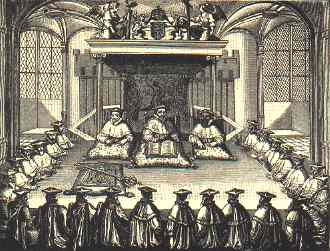The civil law
The two principal systems for administering justice were the common law courts* at Westminster and various courts of "equity"* granted special powers under the Privy Council.
Elizabethans were not shy of litigation: much of what we know of Shakespeare, his family, and his acting company comes from records of lawsuits.
There were also the Ecclesiastical courts run by, and responsible to, the Church; these concerned themselves with moral offences.
Prisons
The extent of crime (or what was considered crime) in London may be gauged by the number of prisons: ten. Newgate is pictured here; another well-known one was the Clink, immortalized in English slang.
In most cases prisoners had to pay for their own food and lodgings; those who were in prison for debt were given an allowance from the money collected each week for the poor.
Footnotes
-
The common law courts
Common law courts dealt with real property and written contracts, resolving litigations by recourse to parliamentary statutes and legal precedents (hence "case law"); verdicts were reached by a jury of twelve persons socially equal to the defendant, presided over by a judge, the system used throughout the realm by J.P.s.
The three courts were:
- The Court of the Queen's (or King's) Bench: mainly concerned with criminal actions brought by the Crown.
- The Court of Common Pleas: handled the bulk of civil actions between private individuals.
- The Court of the Exchequer: specialized in Crown financial rights.
-
The courts of "equity"
The courts of "equity" arose from the inflexibility and tediousness of common law, and dealt with cases not resolved by the lower courts. They held their authority directly from the monarch and Privy Council and therefore had almost unlimited jurisdiction and powers. These rather arbitrary powers were thought to allow judgments more impartial and fair than in any other courts of the kingdom--thus Chancery was known as the "court of conscience" and even the Star Chamber was not associated with tyranny until the reign of Charles I.
The principal courts of equity:
- Chancery: presided over by the Lord Chancellor and most closely connected with the monarch and Privy Council, it was considered the most equitable court in England; Shakespeare's father won a land dispute by appealing to Chancery (see below).
- The Court of the Star Chamber: presided over by Privy Councillors; it dealt especially with criminal justice involving treason, disruption of public order and violated proclamations. Punishment was usually by fines, imprisonment or public humiliation. (It was so named because of the stars on the chamber's ceiling.)
- The Court of Requests: gave special attention to the poor and to servants of the Crown.
- The Court of the Admiralty: dealt with litigations arising at sea or abroad.
- The Court of High Commission: handled ecclesiastical matters.
John Shakespeare's land dispute
He had mortgaged property to Edward Lambert as collateral for a loan, but Lambert refused to cancel the mortgage bond after the loan had been repaid.
